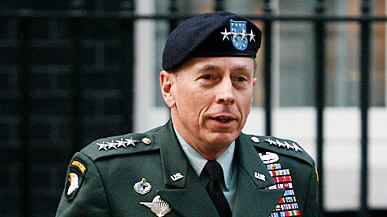Why is a general so lionized hanging up his uniform for a back-bench position? Jamie McIntyre on why Petraeus is headed for the CIA—and not the Pentagon—and how he can help the agency that helped kill Osama bin Laden. Plus, full coverage of bin Laden.
The whispers that began floating around Washington last month that Afghanistan commander David Petraeus was in line to run the CIA were initially dismissed as bizarre rumors.

Why would the most celebrated American general of the post-9/11 era, credited with saving Iraq and charged with salvaging Afghanistan, accept a post where he would be a second-tier adviser to the president on intelligence matters, after the director of national intelligence?
But given the CIA’s prominent role in the killing of Osama bin Laden, the once-beleaguered agency is suddenly seen as hot. A central challenge now facing Petraeus is whether he can match the standard set by Leon Panetta, the former Clinton White House official who is moving on to the Pentagon.
“If anyone had earned the position [chairman of the Joint Chiefs of Staff], I would have thought he had,” said Paul Wolfowitz.
As he completes 37 years in uniform, Petraeus is a rock-star four-star, enjoying a stellar reputation as both a military thinker and a can-do commander. Around his mystique has grown a cult of true believers—politicians, civilian leaders, and fellow officers—who have anointed the West Point graduate a sort of military messiah, crediting with for wrestling victory from the maw of defeat in Iraq, and now hoping his innovative and adaptive tactics can repeat the miracle in the “graveyard of empires,” Afghanistan.
The one job for which Petraeus was preternaturally prepared was the one that was not offered: chairman of the Joint Chiefs of Staff, America’s most senior military officer, who commands no troops but has the ear of the commander-in-chief and who can wield enormous influence as primary military adviser both to the president and the defense secretary.
“If anyone had earned the position, I would have thought he had, and one can only speculate about why they didn’t go with what seems like the obvious choice,” said former Deputy Defense Secretary Paul Wolfowitz, an unabashed member of the Petraeus fan club.
The conventional wisdom is that President Obama didn’t want to risk installing a general popular with Republicans as a potential rival at the Pentagon. The thinking: As chairman, Petraeus would need only raise an eyebrow to effectively damn with faint praise any policy to which he took exception. “All he has to do is say, ‘You know I’ll go public with this,’” said James Carafano of the Heritage Foundation.
Bill Clinton faced that dynamic with Colin Powell. While Powell made a point of saluting smartly in public, his private opposition helped sink some of Clinton’s initiatives, notably the doomed 1993 effort to allow gays to serve openly in the military. Clinton had to be careful not to be seen as going against the advice of his superstar chairman.
Carafano sees a cold political calculus at work. If the Obama administration were simply to allow Petraeus to retire, rather than conveniently fade away, he might surface as a critic. And not just any critic, but one who Carafano said “knows all the secrets of the kingdom.” On the other hand, as CIA chief Petraeus would stay on the reservation and not be nearly so powerful. Carafano argues it’s a good fit for both: “Obama keeps a really highly qualified guy on his team, he keeps him in kind of a smaller box. Petraeus gets to be head of the CIA, which is a pretty cool job. He’ll be able pick and choose, much the way he did as a combat commander, about what he says when, so in a sense they both stay in very comfortable roles.”
Some Petraeus critics also see a cynical calculation at work. With Obama likely to win re-election, they say, the general is just saddling up with the winning side.
But if the president passed over Petraeus as chairman for fear he’d be too hard to control, Obama made a mistake, said Wolfowitz. “I think he’s extremely respectful of civilian authority. To put it in different terms, this guy is no MacArthur,” he said, referring to the general famously fired by Harry Truman for insubordination.
Despite Petraeus’ reputation as ambitious, Wolfowitz insists he saw firsthand that the general was a team player. “He clearly is very competitive, but he is competitive in a team sport, and he’s not like some very ambitious generals who seem to be about themselves…I think if he were more ambitious or a more vain man, he would have said, ‘Either I’m chairman or nothing.’ He’s a good soldier, he really is.”
But how good a general?
Petraeus has his detractors, both in and out of uniform. They argue that “King David,” as they derisively call him, has snowed politicians and is at best treading water in Afghanistan while perpetuating a myth that admittedly is not entirely of his own making.
Among Petraeus’ sharpest and most consistent critics is retired Army Col. Douglas Macgregor, author of several books on military reform. Macgregor sees nothing special about Petraeus, except that he may be more articulate and persuasive than his fellow four-stars.
“I think the Petraeus mantra of ‘What people think in Washington is more important than what happens on the ground,’ is what ultimately he will be remembered for,” Macgregor said. “He will be remembered as someone who is very confident and clever in terms of his ability to influence what people at home thought.”
Macgregor said many of Petraeus’ vaunted victories are myths that will evaporate over time. Turned the tide in Iraq? No, he said, that was the result of the Sunni awakening that predated Petraeus’ time there.
“Iraq is very definitely not a success story for us,” he said. “In fact, if you talk to the Sunni Arab elites in the Arabian peninsula, they are furious with what they call the Islamic Shiite state that we have established in Baghdad.”
The same thing is true in Afghanistan, he said: “You are certainly not getting the truth today from Petraeus in Afghanistan. He’s committed to portraying whatever he’s doing as a success.” Most military analysts also say it’s too soon to judge whether Petraeus’ reputation as the preeminent counterinsurgency strategist will be vindicated in Afghanistan. Petraeus famously “wrote the book” on counterinsurgency, or COIN, as it’s known in Pentagonese, assembling the team that rewrote the Army field manual on the subject and employing various parts of the strategy both in Iraq and Afghanistan.
“In Afghanistan, ultimately, it’s too soon to say,” said Stephen Biddle, a senior fellow at the Council on Foreign Relations. “In Iraq it was remarkably successful.” Biddle said it’s hard to deny that Petraeus did the best that could be done with the cards he was dealt: “He succeeded in an extraordinarily difficult undertaking that most people expected would fail.”
The ever cautious Petraeus is well aware that his current luster could fade with time, as it did for the last wildly popular war general, Colin Powell, whose judgments on Somalia, Bosnia, and even Iraq look flawed with the hindsight of recent history.
Still, Biddle said Petraeus’ legacy seems secure. “Historians looking back on this era are very likely to treat David Petraeus as the most successful military officer of any country in…the first quarter of the 21st century.”
So is Petraeus the “political general” biding his time, waiting until after Obama’s second term to make a run for office? Everyone who knows him says he insists he has no desire to be president. Still, the question comes up all the time, as did it last month on Fox News Channel, when Bret Baier asked if the general had “any political aspirations at all, any?” Petraeus’ response: “No. The answer remains the same. You know, what about ‘no’ don’t you understand?” Baier pressed: “A lot of people out there who say you are a guy that gets things done.”
“I would hate to disappoint them, but I would,” Petraeus said.
Petraeus declined to be interviewed for this article, his spokesman explaining that “the timing wasn’t right,” given that the White House was poised make an announcement about his future.
There may have been another factor. When Petraeus was a two-star general back in 2004 and in charge of training Iraqi troops, he was featured on Newsweek’s cover with the headline “Can This Man Save Iraq?” Pentagon sources tell me that infuriated some of his civilian bosses and resulted in him being passed over as Iraq commander. Obviously, though, it didn’t have any long-term impact on his career.
Jamie McIntyre is the former Senior Pentagon Correspondent for CNN, and an Adjunct Professor of Journalism at the University of Maryland. He blogs on military and media issues at" Jamie McIntyre's Line of Departure," lineofdeparture.com.






